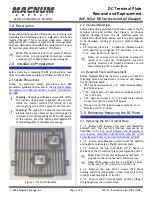
www.prolight.co.uk
S8 DMX Distribution Splitter
User Manual
7
Termination reduces signal transmission
problems and interferance. it is always
advisable to connect a DMX terminal,
(resistance 120 Ohm 1/4 W) between pin 2
(DMX-) and pin 3 (DMX+) of the last fixture.
5-pin XLR (socket)
Pin 1: GND (screen)
Pin 2: Signal (-)
Pin 3: Signal (+)
Pin 4: N/C
Pin 5: N/C
3-pin XLR (socket)
Pin 1: GND (screen)
Pin 2: Signal (-)
Pin 3: Signal (+)
3-pin XLR (socket)
Pin 1: GND (screen)
Pin 2: Signal (-)
Pin 3: Signal (+)
5-pin XLR (socket)
Pin 1: GND (screen)
Pin 2: Signal (-)
Pin 3: Signal (+)
Pin 4: N/C
Pin 5: N/C
DMX setup
Notice:
Be sure to follow the diagrams below when making your own cables. Do not connect the cables
shield conductor to the ground lug or allow the shield conductor to come in contact with the XLRs
outer casing. Grounding the shield could cause a short circuit and erratic behaviour.
Special note:
Line termination:
When longer runs of cable are used,
you may need to use a terminator on
the last unit to avoid erratic behaviour.
Using a cable terminator will decrease
the possibilities of erratic behaviour.
(3-pin - Order ref: CABL9O, 5-pin - Order ref: CABL89)
5-pin XLR DMX connectors:
Some manufactures use 5-pin XLR connectors for data transmission in place of 3-pin. 5-pin XLR fixtures
may be implemented in a 3-pin XLR DMX line. When inserting standard 5-pin XLR connectors in to a
3-pin line a cable adaptor must be used. The diagram below details the correct cable conversion.


























